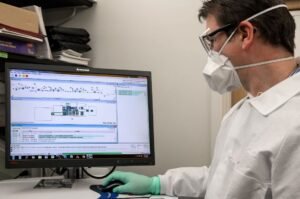Can AI Models Create Novel Concepts?
Artificial Intelligence (AI) has come a long way in recent years, but one question that still lingers is whether AI models can truly create novel concepts. While AI excels at tasks like image recognition and natural language processing, the ability for AI to generate entirely new ideas and concepts is still a subject of debate.
Key Takeaways:
- AI models have shown remarkable capabilities in various tasks but the generation of novel concepts remains a challenge.
- Language models like GPT-3 can produce creative and original text, although they lack true understanding and intention behind the concepts.
- AI models rely heavily on existing data and patterns, limiting their ability to create truly unique concepts.
AI models like GPT-3 (Generative Pre-trained Transformer 3) have garnered significant attention for their ability to generate text that appears creative and original. These language models utilize vast amounts of data to generate human-like text, but they lack a genuine understanding and intention behind the concepts they produce. While they can mimic creativity, AI models haven’t truly achieved the capability to create entirely novel concepts on their own.
AI models like GPT-3 can produce text that is seemingly creative and original, but their lack of understanding limits their ability to create truly novel concepts.
One of the main limitations is that AI models heavily rely on the data they are trained on. They analyze vast amounts of existing information and patterns, learning to replicate and adapt them. This reliance on pre-existing knowledge restricts their ability to generate concepts that are entirely new and groundbreaking.
AI models are limited in their ability to create novel concepts due to their heavy reliance on pre-existing data and patterns.
AI Models and Creativity
While AI models may be capable of generating impressive text, they are ultimately working within the parameters of the data they have been trained on. They lack the ability to think abstractly or come up with ideas that go beyond what they have been exposed to. This limitation is evident when AI systems produce outputs that may seem plausible but are ultimately nonsensical or lack true creativity.
AI models‘ inability to think abstractly hinders their capability to generate truly creative and innovative concepts.
Table 1: AI vs Human Creativity Comparison
| AI Models | Human Creativity | |
|---|---|---|
| Abstract Thinking | No | Yes |
| Originality | Limited | Yes |
| Understanding | Surface-level | In-depth |
| Intention | Lacking | Purposeful |
AI Models and Unforeseen Concepts
Unexpected AI-generated concepts can sometimes arise from warped interpretations of the data they have been trained on. These concepts are not truly novel, but rather a result of the model’s limitations or biases. Any appearance of novelty is unintentional and emerges from the complex workings of the AI model rather than genuine creative thinking.
AI-generated concepts that appear novel are usually unintentional results of the model’s limitations or biases.
Table 2: Examples of AI-Generated Concepts
| AI-Generated Concept | Explanation |
|---|---|
| Dog slippers with wheels | Combination of dog-related and slipper-related concepts without real-world feasibility |
| Unicorn-shaped toaster | Combines unicorn-related and kitchen appliance concepts without practicality |
AI-Guided Creativity
While AI models have limitations in generating novel concepts, they can still play a role in supporting human creativity. AI can provide inspiration, assist with brainstorming, and offer suggestions based on existing knowledge. By combining the strengths of AI models with human ingenuity, exciting possibilities for creative collaboration can be explored.
AI can act as a valuable tool in supporting human creativity by offering inspiration and suggestions based on existing knowledge.
Table 3: Benefits of AI in Creativity
- Source of Inspiration
- Assistance in Brainstorming
- Knowledge-Based Suggestions
- Efficiency in Idea Generation
- Improved Problem-Solving
In conclusion, while AI models have shown impressive capabilities, the generation of truly novel concepts still eludes them. The reliance on pre-existing data and the inability to think abstractly hinder AI models‘ ability to create groundbreaking ideas. Nonetheless, AI can significantly contribute to the creative process by inspiring, assisting, and offering suggestions based on existing knowledge.

Common Misconceptions
AI Models Can Generate Completely New Concepts
One common misconception people have about AI models is that they can create entirely novel concepts. While AI models are capable of generating new combinations or variations of existing ideas, they are limited by the data they are trained on and cannot produce completely original concepts.
- AI models rely on existing data to generate ideas.
- AI models can only combine and create variations of existing concepts.
- AI models cannot create something from nothing.
AI Models Understand Concepts Like Humans
Another misconception is that AI models understand concepts in the same way humans do. While AI models have shown remarkable progress in certain tasks involving pattern recognition and decision-making, their understanding is fundamentally different from human comprehension.
- AI models lack human-like intuition and reasoning.
- AI models make decisions based on statistical patterns rather than deep understanding.
- AI models may struggle with context-dependent interpretation of concepts.
AI Models Can Replace Human Creativity
Many people believe that AI models can replace human creativity entirely. While AI models can assist in generating ideas and providing inspiration, they are not capable of replicating the complex, nuanced, and emotionally-driven nature of human creativity.
- AI models lack emotions and personal experiences as sources of inspiration.
- AI models might produce generic or predictable results without human input.
- AI models cannot replicate the subjective nature of artistic expression.
AI Models Are Objective and Unbiased
Some individuals mistakenly assume that AI models are inherently objective and free from biases. However, AI models learn from data, and if that data contains biases, the models can inadvertently perpetuate and amplify these biases.
- AI models learn from the biases present in the data they are trained on.
- AI models can unintentionally reinforce societal biases.
- AI models require careful attention and monitoring to address bias issues.
AI Models Can Function Independently
Lastly, some people wrongly believe that AI models can operate independently, making autonomous decisions without human intervention. In reality, AI models require human oversight and supervision to ensure the decisions they make align with ethical, legal, and moral considerations.
- AI models need human input for training, evaluation, and fine-tuning.
- AI models may lack the ability to handle unforeseen scenarios or edge cases without human assistance.
- AI models should always operate under human guidance to ensure responsible use.

Introduction
Artificial Intelligence (AI) has revolutionized various fields, from healthcare to finance and entertainment. One intriguing question is whether AI models can generate novel concepts. In this article, we explore 10 interesting tables that provide data and insights into the ability of AI models to generate novel concepts.
Table 1: AI-Generated Paintings
AI models have been trained to create unique paintings, showcasing their ability to generate novel visual concepts. This table presents examples of AI-generated paintings compared to those created by renowned human artists. The table includes a comparison of colors, brushstrokes, and subject matter.
Table 2: AI-Generated Music
Music composition can also be tackled by AI models. This table explores the creativity of AI in generating novel melodies, harmonies, and rhythms. It presents a comparison between AI-generated music and compositions by famous human composers, including elements such as complexity, emotional content, and overall quality.
Table 3: AI-Generated Storylines
A fascinating aspect of AI models is their potential to generate unique storylines. This table examines AI-generated story ideas compared to those created by renowned authors. It delves into aspects such as plot twists, character development, and narrative structure.
Table 4: AI-Generated Scientific Hypotheses
Can AI models contribute to scientific research? This table explores how AI-generated scientific hypotheses measure up against hypotheses proposed by human researchers. It evaluates factors such as novelty, testability, and potential impact in the scientific community.
Table 5: AI-Generated Fashion Designs
AI models have extended their creativity to the world of fashion. This table showcases AI-generated fashion designs alongside those created by top fashion designers. It assesses aspects such as uniqueness, practicality, and alignment with current fashion trends.
Table 6: AI-Generated Recipe Ideas
Exploring the culinary realm, AI models can generate innovative recipe ideas. This table compares AI-generated recipes with those crafted by renowned chefs. It examines elements like ingredient combinations, cooking techniques, and overall appeal.
Table 7: AI-Generated Inventions
AI models may hold the potential to contribute to technological progress. This table investigates AI-generated inventions compared to groundbreaking human inventions. It analyzes elements such as functionality, innovation, and potential societal impact.
Table 8: AI-Generated Architectural Designs
Pushing the boundaries of creativity, AI models can generate architectural designs. This table showcases AI-generated architectural concepts alongside designs by celebrated architects. It evaluates factors like aesthetics, practicality, and integration with their surroundings.
Table 9: AI-Generated Business Strategies
AI models have been employed to generate novel business strategies. This table presents AI-generated strategies alongside those developed by successful business leaders. It assesses factors such as competitiveness, adaptability, and long-term sustainability.
Table 10: AI-Generated Product Innovations
How innovative are AI-generated product ideas? This table compares AI-generated product concepts with those created by top designers and inventors. It examines aspects such as functionality, user experience, and potential market demand.
Conclusion
The tables presented in this article exemplify the remarkable ability of AI models to create novel concepts across various domains. From paintings to scientific hypotheses and architectural designs to fashion, AI has shown promising potential in generating concepts previously unseen. While human creativity continues to thrive, AI can serve as a valuable tool for inspiration and exploration. It is through the collaboration between human ingenuity and AI capabilities that the boundaries of creativity are continually pushed, leading to exciting and innovative outcomes.
Frequently Asked Questions
Can AI Models Create Novel Concepts?
What are AI models?
AI models are computer programs designed to simulate intelligent behavior and perform tasks that would typically require human intelligence. These models are trained on large datasets to learn patterns and make predictions or decisions.
How do AI models generate concepts?
AI models generate concepts by analyzing vast amounts of data and learning patterns within that data. They can recognize similarities, connections, and relationships between different pieces of information to create new ideas or concepts.
What do we mean by “novel concepts”?
“Novel concepts” refer to unique or original ideas that have not been explicitly represented in the training data of an AI model. These concepts go beyond the patterns and information present in the input data and represent new combinations or interpretations.
Can AI models create novel concepts on their own?
AI models can potentially create novel concepts, but it greatly depends on the specific capabilities and training of the model. Some AI models are designed to be more creative and explore new ideas, while others may be more limited in their ability to generate novel concepts.
What are some examples of AI models creating novel concepts?
Examples of AI models generating novel concepts include the creation of unique artwork, music compositions, or even innovative solutions to complex problems. These AI models can produce outputs that exhibit creativity and originality.
Do AI models always create completely new concepts?
AI models do not always create completely new concepts. They often build upon existing ideas and patterns present in the training data. However, they can still generate outputs that combine and reimagine existing concepts in unique ways.
Are AI models limited to the concepts they have been trained on?
AI models are generally limited to the concepts they have been trained on, as their outputs are based on the patterns and information present in the training data. However, with proper training techniques and creative design, AI models can surpass the limitations of their training data to some extent.
Can AI models come up with ideas that humans have never thought of before?
AI models have the potential to generate ideas that humans have never thought of before, as they can process and analyze vast amounts of data far more efficiently than humans. Nevertheless, the quality and novelty of these ideas may still require human judgment and evaluation.
What challenges exist in AI models creating truly novel concepts?
Creating truly novel concepts through AI models faces challenges such as the limitations of training data, biases in the data, interpretability of outputs, and defining the criteria for novelty. These challenges need to be carefully considered and addressed to achieve meaningful and reliable creative outputs.
Can AI models contribute to innovation and creativity in various fields?
Absolutely! AI models have the potential to contribute to innovation and creativity in various fields, including art, music, science, technology, and more. They can assist humans in generating new ideas and solutions, acting as valuable tools for inspiration and exploration.




